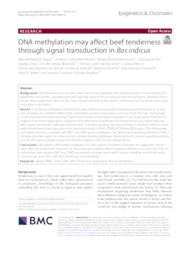DNA methylation may affect beef tenderness through signal transduction in Bos indicus.
DNA methylation may affect beef tenderness through signal transduction in Bos indicus.
Autoria: SOUZA, M. M. de; NICIURA, S. C. M.; ROCHA, M. I. P.; PAN, Z.; ZHOU, H.; BRUSCADIN, J. J.; DINIZ, W. J. da S.; AFONSO, J.; OLIVEIRA, P. S. N. de; MOURÃO, G. B.; ZERLOTINI NETO, A.; COUTINHO, L. L.; KOLTES, J. E.; REGITANO, L. C. de A.
Resumo: Abstract. Background:Beef tenderness is a complex trait of economic importance for the beef industry. Understanding the epigenetic mechanisms underlying this trait may help improve the accuracy of breeding programs. However, little is known about epigenetic effects on Bos taurus muscle and their implications in tenderness, and no studies have been conducted in Bos indicus.Results:Comparing methylation profile of Bos indicus skeletal muscle with contrasting beef tenderness at 14 days after slaughter, we identified differentially methylated cytosines and regions associated with this trait. Interestingly, muscle that became tender beef had higher levels of hypermethylation compared to the tough group. Enrichment analysis of predicted target genes suggested that differences in methylation between tender and tough beef may affect signal transduction pathways, among which G protein signaling was a key pathway. In addition, different meth-ylation levels were found associated with expression levels of GNAS, PDE4B, EPCAM and EBF3 genes. The differentially methylated elements correlated with EBF3 and GNAS genes overlapped CpG islands and regulatory elements. GNAS, a complex imprinted gene, has a key role on G protein signaling pathways. Moreover, both G protein signaling pathway and the EBF3 gene regulate muscle homeostasis, relaxation, and muscle cell-specificity.Conclusions:We present differentially methylated loci that may be of interest to decipher the epigenetic mecha-nisms affecting tenderness. Supported by the previous knowledge about regulatory elements and gene function, the methylation data suggests EBF3 and GNAS as potential candidate genes and G protein signaling as potential candi-date pathway associated with beef tenderness via methylation.
Ano de publicação: 2022
Tipo de publicação: Artigo de periódico
Unidade: Embrapa Pecuária Sudeste
Palavras-chave: Bos Indicus, Bos Taurus, Cattle, DNA methylation, EBF3, Epigenoma, Epigenome, Força de cisalhamento, GNAS, Methylation, Metilação, Muscle, Músculo, Músculo de nelore, Nelore, RRBS, Shear force
Observações
1 - Por padrão são exibidas publicações dos últimos 20 anos. Para encontrar publicações mais antigas, configure o filtro ano de publicação, colocando o ano a partir do qual você deseja encontrar publicações. O filtro está na coluna da esquerda na busca acima.
2 - Para ler algumas publicações da Embrapa (apenas as que estão em formato ePub), é necessário ter, no celular ou computador, um desses softwares gratuitos. Sistemas Android: Google Play Livros; IOS: iBooks; Windows e Linux: software Calibre.
Acesse outras publicações
Acesse a Base de Dados da Pesquisa Agropecuária (BDPA) para consultar o acervo completo das bibliotecas da Embrapa.

